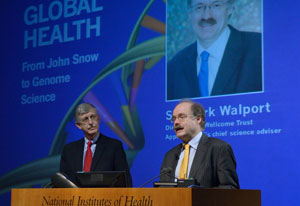Genomics is transforming infectious disease studies
January / February 2013 | Volume 12, Issue 1

Photo by Ernie Branson/NIH
Wellcome Trust Director Sir Mark Walport discussed
the potential of genomics to transform the study of
infectious diseases as he delivered the 12th annual
David E. Barmes Global Health Lecture.
With unexpected speed, the field of genomics is revealing secrets of some of the world's most persistent pathogens. Scientists now have molecular tools to track how diseases spread and understand the tricks they use to become more virulent or develop drug resistance, according to Sir Mark Walport, who spoke recently at the NIH.
"Modern genetics has the potential to transform the management and assessment of infectious disease," said Walport, who directs the Wellcome Trust and will become the U.K.'s chief science adviser in April. "The tools that are available for research in terms of their power and their scale are such as we've never had before."
Walport visited NIH to deliver the annual David E. Barmes Global Health Lecture that honors its namesake for his career spent improving health in low-income countries. The lecture is co-sponsored by the National Institute of Dental and Craniofacial Research (NIDCR) and Fogarty.
During his talk, titled "From John Snow to Genomic Science," Walport illustrated the progress in medical science since physician John Snow determined that London's 1854 cholera epidemic came from a single water pump rather than bad smells in the air as popularly believed. Now, scientists have sequenced the genomes of varying vibrio cholera strains in samples going back over 100 years, giving insight into the bacterium's structure, rate of mutations and global spread.
Genomic studies of other pathogens are likewise giving valuable insight while simultaneously raising questions about how to manage disease. For instance, health authorities are asking whether closing national borders can stem epidemics. A U.K. study of a swine flu outbreak showed the virus entered the country independently at numerous points before any cases had even been identified in physician offices.
Aside from revealing how pathogens spread internationally, genomics can also help pinpoint how they spread locally. In a U.K. hospital, sequencing of methicillin-resistant Staphylococcus aureus led researchers to identify the single staff member behind an ongoing outbreak in the pediatric ward. "So this tells you stuff about bacterial infection in a single hospital in a way you wouldn't have known before," Walport said.
Genomics also has enormous potential to identify bacterial virulence and drug resistance, holding the promise of tactics to counteract both and to develop new drugs and vaccines, he noted, adding that such insight is urgently needed to stop malarial Plasmodium parasites, which are building resistance to the most effective drug, artemisinin.
Genomic sequencing "will tell us more about the pathogenicity, we will be able to identify the virulence factors, we'll be able to identify the antibiotic resistance as it evolves, and importantly, we're going to be able to investigate transmission of infections both at the global scale but also at the local scale in ways that will alter clinical management," Walport said.
Walport hailed the many partnerships built between the Wellcome Trust and NIH to further genomics understanding, including the Human Genome Project, Hapmap and Cancer Genome Project. Most recently, the two organizations established the Human Heredity and Health in Africa (H3Africa) Initiative, a project funding studies of genomics and environmental causes of diseases and of drug responses common in Africa. "We have funded some quite exciting projects, for example, people are looking at the genetics of susceptibility to rheumatic fever," he said.
H3Africa and other partnerships are essential to nurture research capacity in developing countries. "Successful scientists must have an environment in which they can operate as well," Walport said. "All too often, we see superb scientists from parts of the developing world, where there is very little local institutional capacity, vote with their feet and leave."
Forging research partnerships is also critical, he noted. "Building capacity is about connections between people, increasingly it's about interdisciplinary research, about developing teams, leaders, mentorship. And the challenge for all of us," he concluded, "is to make the whole greater than the sum of its parts."
More Information
To view Adobe PDF files,
download current, free accessible plug-ins from Adobe's website.